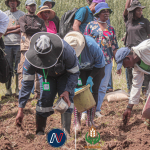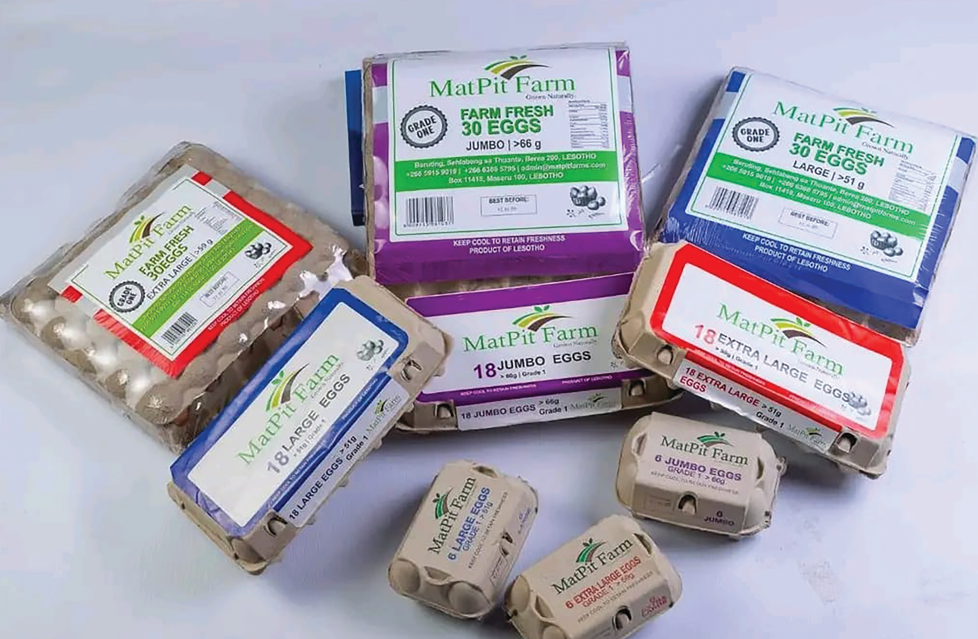Contract farming is quietly reshaping Lesotho’s agricultural sector, bringing structure and opportunity to a system long marked by uncertainty.
Introduced in 2021, the initiative has created new possibilities for smallholder farmers, offering them access to formal markets and a chance to transform subsistence farming into a commercial enterprise.
At the heart of the initiative is a partnership between the Food and Agriculture Organization of the United Nations (FAO) and Lesotho’s Ministry of Agriculture, Food Security and Nutrition (MAFSN), implemented through its Department of Marketing. The contract farming model was first piloted in May 2021 with Tasty Food Packers Ltd., one of Lesotho’s four major packagers.
The company specialises in the processing and packaging of dry beans, maize, and rice.
Although it lacks the capacity to provide production inputs or technical support, Tasty Foods was keen to secure a consistent, local supply of high-quality dry beans.
The pilot chose sugar beans as the crop of focus and engaged ten farmers across Butha-Buthe, Leribe, Berea, and Maseru districts.
These farmers cultivated 31.4 hectares, producing approximately 24.3 tons of beans.
The initiative was closely monitored by the Department of Marketing to ensure its goals were being met.
But the journey hasn’t been without challenges.
“The pilot was not as successful as we had hoped due to heavy rains that affected the produce,” Nizam Abubaker, Managing Director of Tasty Foods Ltd, revealed.
However, he emphasises the importance of resilience.
“These challenges shouldn’t discourage farmers. The goal is to stabilise the model and grow from what we have learned. The most important thing is for farmers to communicate early when production problems arise,” he said.
For Abubaker, contract farming is a strategic move.
Currently, only 10% of Tasty Foods’ packaged beans come from local farmers, while 90% are imported from South Africa.
The company aims to reverse that ratio.
“We want to grow the local market and see Lesotho’s agriculture thrive,” he said, disclosing that preparations are underway with the Ministry to recruit more farmers for the upcoming season, and Abubaker is using every opportunity to raise awareness among farmers.
The Ministry’s Department of Marketing is leading this effort, with Maleshoane Lishaba, Head of Contract Farming and Statistics, seeing the initiative as a critical link in Lesotho’s agricultural transformation. “Contract farming aligns with the National Strategic Development Plan II (NSDP II), which focuses on private sector-driven growth and agribusiness as tools to fight poverty and create jobs. It creates structured, mutually beneficial relationships between farmers and buyers,” she describes.
She added that in essence, contract farming allows producers and buyers to sign formal agreements detailing the type of produce, quantity, quality, price, and timelines for delivery.
She indicated that this gives farmers the assurance of a guaranteed market and income, while providing buyers with a reliable, consistent supply of produce that meets specific standards.
FAO, one of the key implementers, highlights that contract farming isn’t just about selling crops, but about collaboration from seed to sale.
“This often involves the buyer offering guidance on production methods, inspection, and quality control. The buyer isn’t just purchasing a product; they are investing in how that product is produced from the land cultivation level to harvesting,” FAO Communications Specialist, Mathabana Kotelo, noted.
MatPit Farm in Maseru is one of the success stories.
Its general manager, Rankakalo Tebatso, shared that contract farming has been a game-changer towards their growth.
“Our buyers send auditors to check if we are meeting their standards. That support has improved our operations,” he says.
“Besides, having a guaranteed buyer gives us peace of mind.”
MatPit supplies eggs under contract to retailers like Pick n Pay, Econo Foods, Stadium Foods, and Avani Hotels.
Still, challenges persist.
Delays in receiving subsidised agricultural inputs have sometimes thrown off production schedules.
Climate variability, unpredictable droughts, rains and frosts have made it difficult for farmers to meet contractual quality and quantity requirements, Abubaker said.
“Many farmers made good progress, especially those who got inputs on time, but issues like pests, erratic rainfall, and lack of machinery impacted yields,” Kotelo said.
Farmer perceptions also varied. Some initially distrusted the model, fearing unfair pricing or rigid expectations. But those who fully engaged have seen clear benefits.
“The more they understand the contracts, the more they see how it works in their favour,” says Kotelo.
Since the pilot, the initiative has expanded.
Nineteen farmers now have contracts to supply a broader range of commodities—cabbage, lettuce, spinach, cucumber, peppers, and marrows to formal buyers including Maloti Fresh Produce and Fruits & Vegetables. These developments have come without external funding, showing strong organic growth and interest.
Contract farming is not a new idea globally. It has been adopted in many countries as a way to modernise agriculture and connect farmers to structured markets.
In Lesotho, it is especially promising given the sector’s current constraints. Many smallholder farmers face poor access to inputs, a lack of market information, low productivity, and limited bargaining power. These challenges have kept them from transitioning to commercial farming.
The 2024 Lesotho Contract Farming Model Agreement, developed with FAO, lays out clear roles and responsibilities for both farmers and buyers. It covers everything from crop specifications to pricing mechanisms, delivery logistics, inspection procedures, payment terms, and conflict resolution.
It also includes annexes on phytosanitary measures, communication protocols, and standard documentation, making the agreement legally grounded and flexible.
However, FAO warns that without careful design, contract farming can exclude marginalised farmers.
“High transaction costs, land inequality, or vague contract terms can push some farmers out,” says Kotelo, stressing the importance of ensuring that contracts are fair and inclusive.”
The model is gaining traction not only due to its promise of income but because it can bring stability to food systems.
The COVID-19 pandemic exposed the fragility of cross-border supply chains.
“Retailers now realise the importance of sourcing produce locally. They are willing to work with farmers, but they need consistency and quality checks,” says Lishaba.
Progress has continued through 2024/25. Formal contracts were signed in five districts: Maseru (8), Mohale’s Hoek (4), Leribe (2), Thaba-Tseka (1), and Quthing (4).
Farmers are supplying perishable crops that require more intensive care than beans, showing confidence in the model. Buyer-seller platforms were held across all 10 districts, allowing direct engagement between farmers and potential buyers. These sessions were also used to assess on-the-ground implementation and inform future policies.
The Department of Marketing has increased visibility through media, including newsletters, radio programs, and briefings. It is also working on a Contract Farming Legal Framework, intended to harmonise agreements and protect all stakeholders.
Despite challenges such as limited transport and tight budgets, the results have laid a solid foundation for future growth.
That growth won’t be without hurdles.
The ministry revealed that in some cases, traders failed to honour their commitments, citing oversupply or changing sourcing strategies, and this left some farmers with unsold produce. There was also low participation in some districts, suggesting that more mobilisation and education was needed.
Looking ahead to 2025/26, the department has a clear strategy.
“District Marketing Officers will be equipped to lead contract farming efforts locally. The number of formal contracts will be increased, and youth and women will be targeted through a dedicated pilot program.
“A digital contract register will be developed for transparency, and seasonal feedback surveys will gather real-time insights from both farmers and traders. These efforts will feed into the creation of a national Contract Farming Bill.”
Contract farming aligns with Lesotho’s larger goals of economic transformation. It supports private sector engagement, creates rural jobs, and helps smallholder farmers scale up. As Lesotho shifts from a consumer-based economy to one driven by local production and exports, contract farming is poised to play a pivotal role.
Lishaba said at its core, contract farming is about trust and shared value. “It’s about farmers knowing their produce has a guaranteed buyer, and buyers knowing they’ll receive quality goods on time,” she said.
With sustained policy direction, strong institutions, and stakeholder alignment, this initiative could help build a new chapter for Lesotho’s agricultural economy—one where farmers are empowered, markets are structured, and food security is no longer a distant dream.








